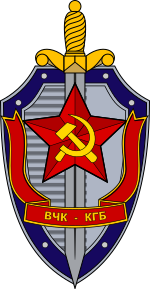
Back KGB Afrikaans لجنة أمن الدولة (الاتحاد السوفيتي) Arabic كيه جى بى ARZ KGB AST SSRİ Dövlət Təhlükəsizlik Komitəsi Azerbaijani СССР Дәүләт именлеге комитеты Bashkir Камітэт дзяржаўнай бяспекі СССР Byelorussian Камітэт дзяржаўнай бясьпекі СССР BE-X-OLD Комитет за държавна сигурност (СССР) Bulgarian কেজিবি Bengali/Bangla
This contains several duplicated citations. (February 2024) |
| Комитет государственной безопасности (КГБ СССР) Komitet gosudarstvennoy bezopasnosti (KGB SSSR) | |
 | |
| Agency overview | |
|---|---|
| Formed | 13 March 1954 |
| Preceding agencies | |
| Dissolved | 3 December 1991 |
| Superseding agencies | |
| Type | State committee of union-republican jurisdiction |
| Jurisdiction |
|
| Headquarters | Lubyanka Building, 2 Bolshaya Lubyanka StreetMoscow, Russian SFSR |
| Motto |
|
| Agency executives |
|
| Child agencies |
|
The Committee for State Security (Russian: Комитет государственной безопасности, romanized: Komitet gosudarstvennoy bezopasnosti, IPA: [kəmʲɪˈtʲed ɡəsʊˈdarstvʲɪn(ː)əj bʲɪzɐˈpasnəsʲtʲɪ]), abbreviated as KGB (Russian: КГБ, IPA: [ˌkɛɡɛˈbɛ]; ⓘ) was the main security agency of the Soviet Union from 1954 to 1991. It was the direct successor of preceding Soviet secret police agencies including the Cheka, OGPU, and NKVD. Attached to the Council of Ministers, it was the chief government agency of "union-republican jurisdiction", carrying out internal security, foreign intelligence, counter-intelligence and secret police functions. Similar agencies operated in each of the republics of the Soviet Union aside from the Russian SFSR, where the KGB was headquartered, with many associated ministries, state committees and state commissions.
The agency was a military service governed by army laws and regulations, in the same fashion as the Soviet Army or the MVD Internal Troops. While most of the KGB archives remain classified, two online documentary sources are available.[1][2] Its main functions were foreign intelligence, counter-intelligence, operative-investigative activities, guarding the state border of the USSR, guarding the leadership of the Central Committee of the Communist Party and the Soviet Government, organization and security of government communications as well as combating nationalist, dissident, religious and anti-Soviet activities. On 3 December 1991, the KGB was officially dissolved.[3] It was succeeded in Russia by the Foreign Intelligence Service (SVR) and what would later become the Federal Security Service (FSB). Following the 1991–1992 South Ossetia War, the self-proclaimed Republic of South Ossetia established its own KGB, keeping the unreformed name.[4] In addition, Belarus established its successor to the KGB of the Byelorussian SSR in 1991, the Belarusian KGB, keeping the unreformed name.
- ^ Rubenstein, Joshua; Gribanov, Alexander (eds.). "The KGB File of Andrei Sakharov". Annals of Communism. Yale University. Archived from the original on 21 May 2007.
- ^ JHU.edu Archived 25 April 2011 at the Wayback Machine, archive of documents about the Communist Party of the Soviet Union and the KGB, collected by Vladimir Bukovsky.
- ^ "Закон СССР от 03.12.1991 N 124-н о реорганизации органов государственной". pravo.levonevsky.org. Retrieved 25 June 2023.
- ^ Kolev, Stoyan (11 March 2009). "KGB Backyard in the Caucasus". Retrieved 19 January 2014.